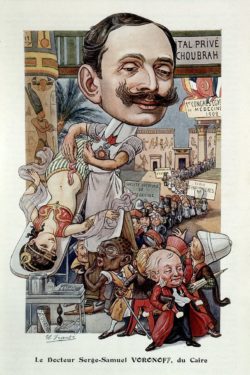Conference
New Historical Perspectives on Ageing and the Life Course
19-20 March 2018, Weetwood Hall, University of Leeds, UK

Caricature of Serge Samuel Voronoff
Credit: Wellcome Library, London. Wellcome Images
images@wellcome.ac.uk
http://wellcomeimages.org
S. S. Voronoff performing an appendectomy (lit. binding of the middle-appendix in his hospital at Choubrah; at the same time, with the patient anaesthetised, a dance in honour of Congressistes (doctors of the Congress of Tropical Medicine in Cairo) is started.
20th Century Chanteclair, 1910, 5, No.
Chanteclair,
Published: 1910
Copyrighted work available under Creative Commons Attribution only licence CC BY 4.0 http://creativecommons.org/licenses/by/4.0/
In recent decades, global research activity around ageing and the life course has grown exponentially. Work in the clinical sciences, and in the established field of gerontology, has explored the challenges and opportunities of ageing through investigations focusing on biological and biosocial elements. More recently, scholars in the humanities and the social sciences working in the field of ageing studies have been turning their attentions to the topic, offering interdisciplinary cultural and social analyses that are theoretically, politically, and empirically engaged. Within this category, a number of scholars across academic disciplines including history of medicine, philosophy, film studies, literature, law, sociology, psychology, and anthropology – and in the cross-disciplinary field of medical humanities – are united by a shared interest in historical perspectives on youth, ageing, and old age.
This two-day conference brought together scholars whose work engages with the past, to share new perspectives on the role and value of historical approaches to ageing across disciplines in the humanities and the social sciences. Several key questions framed the papers:
- What can historical research on ageing and the life-course in the humanities and social sciences offer that is distinctive from modes of enquiry in these areas in the clinical sciences?
- To consider ageing in historical contexts is to encounter issues of disciplinary boundaries and hierarchies, dominant histories, and canonicity. What is the specific nature of these challenges, and how might they be navigated?
- Is it enough to reconstruct historical, socio-cultural contexts of ageing? Or should historical projects also develop innovative approaches that will address present-day issues?
- How might scholars in the humanities and social sciences whose work includes historical approaches work together across disciplinary boundaries?
- Who are the audiences for historical research in ageing? How might we communicate effectively with the academic sciences, with non-academic audiences, and with policy-makers, and public-health organisations?
- What are the broader implications of this kind of work for developing further knowledge and understanding of the role of historical approaches to the study of human health, disability, disease, minds and bodies?
Our keynote speakers were Dr Sarah Falcus (University of Huddersfield) who has published widely on the manifestations of ageing and older age in contemporary fiction, and Dr Hyung Wook Park (Nanyang Technological University, Singapore) whose historical research explores the relationship between gerontology and changing social perspectives of ageing in the first half of the twentieth century.
Interdisciplinarity in Practice: Medical Humanities Research Workshop for PGRs
7 September, Marks and Spencer Company Archive, University of Leeds
This one-day workshop addressed the scholarly challenges and collaborative opportunities surrounding postgraduate research in the medical humanities.
Increasing numbers of postgraduate students from a wide range of disciplines are undertaking work on human health, wellbeing, disease, and the body that entails interdisciplinary approaches. Conducting PhD research across disciplinary boundaries offers significant opportunities for innovative scholarship, but it can also present practical and intellectual challenges for those at the earlier stages of their academic careers.
The workshop brought together postgraduate students in the medical humanities for interactive sessions and open discussion on research skills and professional career development in the field. Speakers included Dr Emily T. Troscianko (Oxford), Dr Victoria Bates (Bristol), Dr Sam Goodman (Bournemouth), Dr James Stark (Leeds) and Dr Catherine Oakley (Leeds), with a keynote address from Professor Jane Macnaughton (Durham).
Perspectives on Human Regeneration
We ran three previous events held throughout 2016 at the Henry Moore Institute (19 January), Thackray Medical Museum (4-5 April) and Marks and Spencer Company Archive (6-7 July). These combined formal presentations, provocations and semi-structured discussion and debate. Reports and selected presentations are available here.
Emerging from these events we are currently putting the finishing touches to a special issue of the interdisciplinary journal Palgrave Communications. This is focused on the theme "Perspectives on Human Regeneration" and will appear in late 2017/early 2018. If you would like to be kept updated on the issue, please contact us.
